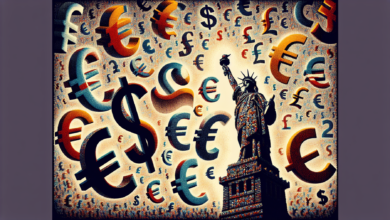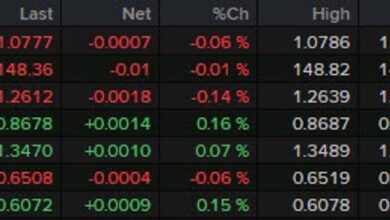A Rising Yen Is Good for Stocks. Here’s Why.

Just as a falling yen seemed ready to be the next reason cited to prove the sky is falling, Japan’s currency is starting to rebound. That may not be great if you’re traveling to Japan in a week or two, but it’s fantastic news for global markets.
It’s hard to overstate just how weak the yen has been against the U.S. dollar this year. Through the end of April, the dollar had gained 11% against the currency, to 157.80 yen, riding a four-month winning streak that was its longest since December 2014. Currency weakness, while initially good for Japan’s exporters such as
can be a sign of larger problems if it goes too far, and the recent declines had some investors wondering if the strong dollar might be ready to make things break. It was enough to get Japan’s central bank to try to support the yen this past week.
attempt wasn’t all that successful. On Monday, the dollar dropped around five yen on reported intervention, but it took around 6 trillion yen to generate that move, notes
strategist Nikolaos Panigirtzoglou. The last time Japan intervened, in September and October 2022, it took far less to generate a move of that size, with an average of 3 trillion yen being spent during the three interventions. “This may imply that Japanese authorities would have to consume a greater amount of foreign currency reserves to have the same impact,” he writes.
Thankfully, the BoJ might not need to spend much more. The combination of a softish U.S. payrolls report—the 175,000 jobs added in April were fewer than expected but strong enough that we don’t need to worry about the economy—and Jerome Powell’s dovish tone at Wednesday’s Fed meeting was enough to send U.S. yields down, and the dollar with it. (Currencies often trade on the differences between interest rates and growth between two countries.)
“With the impetus toward higher U.S. interest rate expectations that has driven the greenback’s rebound this year now stalling—and potentially going into reverse—there may be space for a new narrative to take hold across markets,” writes Jonas Goltermann, deputy chief markets economist at Capital Economics.
Rich Ross, head of technical analysis at Evercore ISI, notes that the reversal in the dollar against the yen is a sign that the risk-on mood that seized the market late this past week should continue. That would be good news for software, utilities, semiconductor, and emerging market stocks. “ ‘The yen is your friend if you are bullish,’ so stay long/get long in anticipation of a new
high above 5,300 in [the first half of the year],” Ross writes.
Advertisement – Scroll to Continue
A stronger yen also means a weaker dollar, which should be a relief for U.S. multinationals, many of which cited currency as a drag on their earnings. 3M, for instance, said that the strong dollar would shave 1% from sales and 20 cents from full-year earnings per share, while
CEO James Quincey cited currency as just one headwind that the company had to navigate during the first quarter of 2024. Even
Amazon
.
com cited the “unfavorable impact from global currencies weakening against the U.S. dollar.”
The dollar doesn’t have to weaken a lot, but every bit certainly helps.
Write to Ben Levisohn at Ben.Levisohn@barrons.com





